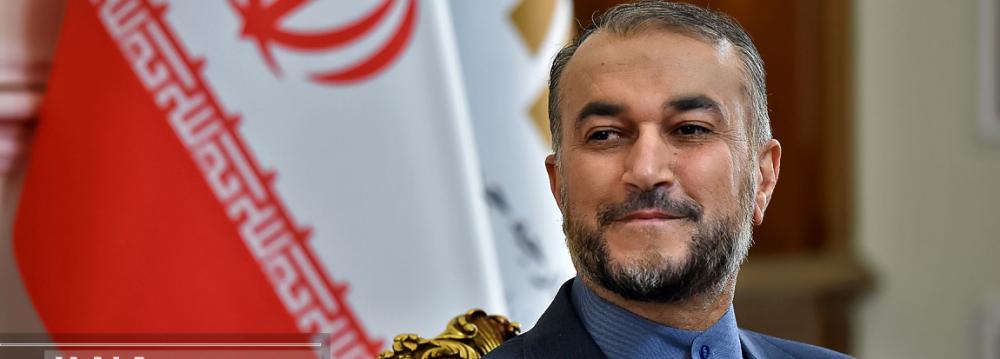Constructive talks on the revival of the 2015 nuclear deal depend on the United States’ seriousness, initiative and flexibility, Iran’s foreign minister said.
Hossein Amir-Abdollahian made the remarks in a phone conversation with his Omani counterpart Sayyid Badr Albusaidi on Tuesday, ISNA reported.
He also reiterated Iran’s seriousness in efforts to reach a strong and lasting agreement.
The Omani top diplomat also underlined the need for achieving a final agreement on JCPOA.
“Oman supports efforts to reach a deal in nuclear talks and fulfillment of Iran’s legitimate demands,” he said.
Oman played a facilitating role in negotiations that led to the signing of the nuclear deal, known as the Joint Comprehensive Plan of Action.
Muscat was also among options to host proximity talks between Iran and the US, mediated by the European Union and aimed at removing final obstacles to the restoration of the agreement.
The JCPOA offered sanctions lifting to Iran in return for curbs on its nuclear program, but the US pulled out four years ago and reimposed those bans, prompting Tehran to react by rowing back on its commitments.
Negotiations began in April 2021 in Vienna, Austria, to work out how both sides can resume compliance, but the talks reached a deadlock in March over a few outstanding issues.
The EU as coordinator of the deal arranged indirect talks between the two in Doha, Qatar, so that they can resolve their bilateral disputes. The first round of negotiations ended with meager progress last week.
Iran blamed the US administration’s weakness and inability to make a final decision for lack of progress in Doha, saying Washington’s insistence on its proposed draft text in Vienna that excludes any guarantees for Iran’s economic benefit prevented the negotiations from coming to fruition.
Amir-Abdollahian had said earlier that the US attended Doha talks with no initiative or an approach in favor of progress and only repeated previous positions.
Nevertheless, Iranian officials stressed that the Islamic Republic is ready to engage constructively in next stages.
American officials, on the other hand, accused Iran of raising issues that were either outside the scope of the JCPOA, or already debated and resolved in Vienna.
“They have, including in Doha, added demands that I think anyone looking at this would be viewed as having nothing to do with the nuclear deal, things that they’ve wanted in the past,” US Special Envoy for Iran Robert Malley said in an interview with National Public Radio on Tuesday.
The US and the Europeans argue that those demands could not be part of JCPOA negotiations.
Other officials have offered an extremely pessimistic view, saying the chances of reviving the JCPOA are worse after Doha talks and will be getting worse by the day.
Iran denies having made new and maximalist demands, maintaining that it wants “verifiable and objective guarantees from the US that JCPOA will not be torpedoed again, that the US will not violate its obligations again, and that sanctions will not be reimposed under other pretexts or designations,” according to Iranian representative to the UN, Majid Takht-Ravanchi.


